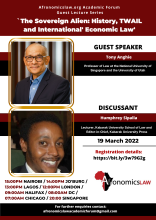Call for Papers: Journal of International Economic Law Junior Faculty Forum
The Forum welcomes submissions covering a wide range of international economic law topics – trade, investment, finance, tax, labor, intellectual property, data, and other topics reflective of the broad nature of the field. Scholars who have previously presented in the IEL‐Forum are not eligible to apply.
